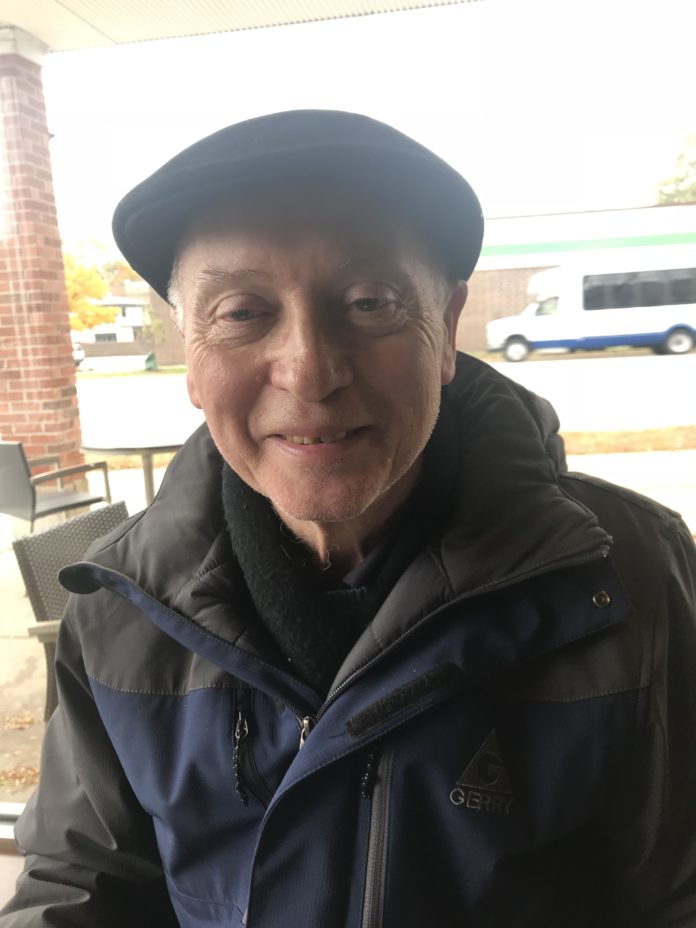Asking someone you don’t know to tell you their life story isn’t easy. At first, I’m usually met with a confused look and an expression that says, “Who is this crazy lady”? This time, I decided to speak with someone I’ve seen many times from Hungarian Kosher Market. After circling the store a few times, I finally got the courage to approach an employee from behind the deli counter, Mark Levine. Before this day, the only conversation I had with Mark was to place an order. When I asked for the interview, Mark’s smile was so genuine and appreciative, that I knew he was someone worth getting to know. We decided to meet at Starbucks for the interview. Mark walked in wearing a wool flat cap and a big smile. His demeanor was so friendly and inviting that it was a pleasure speaking with him. Mark told his stories with emotion, depth, and at times a nostalgic twinkle in his eye. One of the first things we spoke about was our common interest in writing. Mark always had a passion for writing, and in 2016 Mark’s book, Life in Two Suitcases (1), was published. The book is a history of four generations of two families from Eastern Europe, and their eventual arrival to the United States. Our interview told some of these stories, but I only learned of the title’s meaning towards the end of our meeting.
Meet Mark Levine:
Mark Levine was born in 1949 in Minsk, Belorussia (2). He was the only child of Holocaust survivors, Solomon and Dina Levine. Eight years before Mark was born, Solomon and Dina knew nothing of each other. Belorussia was one of the three Communist Republics of the U.S.S.R (Union of Soviet Socialist Republics). Minsk had a flourishing Jewish community at the time of the German invasion, but eventually became the home one of the largest Jewish ghettos in Eastern Europe. The Nazis were responsible for killing 66% of the Belorussian Jews. Before the situation worsened, Solomon left his family to join the Russian army, assuring them he would return as soon as possible. When he returned, his entire family had been killed by the Nazis. Solomon’s father, wife and two young daughters, ages 5 and 3, were all gone (his mother passed away before the war). Dina was pregnant when she was evacuated from Minsk, and upon returning, learned her husband had been killed. Dina eventually gave birth to a daughter who passed away 8 months later. Fortunately, Dina had a sister and was able to reunite with her back in Minsk. In 1948, Solomon and Dina met, married and had Mark one year later.
After the Germans were defeated, Belorussia remained a part of The Soviet Union. Although the war was over, Minsk was still dangerous for Jews and anti-semitism remained. There was one shul in the city, but it was difficult to get there. The KGB, the main security agency for the Soviet Union, roamed the streets undercover looking for traitors of the Communist regime. Jews were especially targeted. Many Jews were outwardly Communists, but would meet in private to continue observing a Jewish lifestyle.
Mark loved music while growing up and learned to play the Bayan (Russian accordion). Although he had an interest in music and writing, elementary and high school were harder for Mark. He was consistently mocked and beaten for being a Jew. I asked Mark why the teachers didn’t stop the harassment.
“The teachers were afraid of the high school students. They could have lost their jobs for being sympathetic to Jews”, Mark explained. “College professors carried on the same way, afraid of losing their jobs as well. Even more so from the Jewish professors. Maybe it was because they had more to lose”.
Mark remembered that many Jewish professors would insult and ridicule Jewish students. They had to appear as devout Communists and protect themselves from appearing as supporters of Jews.
Mark continued, “One of my Jewish teachers was teaching history. Some students hated me, bullied me and continued to joke ‘Mark, is the teacher your father? You look the same’, while they laughed at both of us. The teacher was worried about his career and needed to prove that he didn’t like Jews. He asked me a question and then screamed, ‘SIT DOWN! YOU DON’T KNOW ANYTHING’!”
Despite the difficulties growing up, Mark attended Belarus Technical College, where he studied Engineering. Around this time, he met his wife, Rita. They married in 1973 and had two children, Marina and Alex.
On December 19, 1989, after years of living in a corrupt and dangerous country, Mark, his father Solomon, Rita, and their two children packed up and began their journey to America. Sadly, Mark’s mother passed away three weeks before they left from an ongoing illness. She was buried with her sister in Minsk.
“We left because it had become a scary situation. There was no government order, a lot of anti-semitism, uncontrollable street crime, violence, and general disorder”.
At the border, the guards checked everything for hidden gold or money. The family visas, but the border guards let them know that if someone had anything more than the allotted amount, he would be sent back to Russia and put in jail. Mark and his family were kept at the border the entire day, while the guards worked endlessly trying to find a reason to send them back. After spending two generations as citizens of Russia, each member of the family was allowed to take $90 dollars and two suitcases. Mark’s mother-in-law began to cry.
“In these two suitcases is my entire life”. At this point, I understood his book’s title, Life in Two Suitcases. A little over 2 years later, the Soviet Union and the Communist regime finally collapsed.
Today, Mark lives in Buffalo Grove with his wife Rita. Rita is a dental hygienist and Mark has worked for Hungarian for almost 30 years. His children, Marina, a homemaker and Alex, a financial advisor, both live nearby with their children.
“When my son had his daughters Alyssa and Briana, it reminded me of the two daughters my father lost in the Holocaust. It felt like we were helping to bring them back”, Mark said with pride.
Mark loves to travel deeply appreciates architecture from around the world. He’s traveled to many countries including Israel, Britain, France, Vienna, and Mexico. Mark told me why Paris was his favorite vacation so far.
“There was a work trip in 1972 to Paris for a group of engineers to see the Pompidou Center (3). I was not allowed to go, because you needed to be a member of the Communist party, and because I was a Jew.”
Mark’s engineering background gave him the opportunity to work with many talented architects. It was painful to be excluded from the trip, because of his deep appreciation for unique architecture. Then finally, in 2001, Mark traveled to Paris on vacation. With a look of vindication, Mark said, “I went only to see the George Pompidou building. I didn’t go to many places in Paris, but this was a place I wanted to see. What? I’m going to see one more cemetery? This was the only place I wanted to go. I had great pleasure from this and I spent all day there.”
Mark’s Advice to the World: “Maybe I’m not going to be original, because most people say this, but I agree with them. Be kind. Forgive people. Sometimes it is difficult to forgive. I understand those Jewish professors and why they treated me this way, and I forgive them. Today, we have to double the kindness and forgiveness, and maybe the world will be better.”
_______________________________________________________________________
- Mark’s book can be found on Amazon. It is written in Russian, and he is currently looking for someone to translate the book into English. If someone is interested in the job, or knows someone who is call Mark Levine at (847) 722-4604.
2. Belorussia became the independent country of Belarus during the fall of Communism in 1990.
3. Pompidou Center is an award winning architectural masterpiece named after the President of France from 1969-1974.







